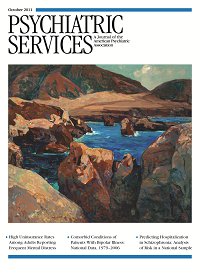Assessing the Career Satisfaction of Psychiatrists: Reply
We thank Dr. Weissman for his comments on our article. He raises some interesting issues, and we appreciate the opportunity to address them.
The first concern raised by Dr. Weissman is in regard to the absence of information about the representativeness of the sample. Our study is based on data collected by the Center for Studying Health System Change in its 2008 Health Tracking Physician Survey (www.hschange.org/CONTENT/1085/1085.pdf). The survey is based on a classical stratified design with proportional allocation. The weighted response rate for specialists, which includes psychiatrists, was 61.9%. Unfortunately, no details are provided regarding the total number of surveys sent to physicians within each specialty.
Dr. Weissman singled out the statement that older psychiatrists cannot afford to retire. We feel that our statement has been taken out of context. In fact, the article states, “However, in terms of decision to retire, one major factor that is not dealt with in the study is the financial aspirations and overall financial situation for the physician. It is very likely that many psychiatrists of retirement age continue to work because they cannot afford to retire.” Note that this statement is merely a conjecture on our part and is not an issue that was examined in our analyses. It does, however, present an interesting topic for future research.
Dr. Weissman's speculation that the shorter work schedule of younger physicians (including psychiatrists) is offset by the extended workload of new psychiatrists who engage in medication management practice, while interesting, is not borne out by our findings. The shortage of psychiatrists, however, is a matter of critical concern that has been noted in various national journals, as we reported in our article.
Dr. Weissman's comments on malpractice suggest that it may not be a major issue for psychiatrists. In fact, the blog by David Leonhart cited by Dr. Weissman quotes from the New England Journal of Medicine: “Although … annual rates of paid claims are low, the annual and career risks of any malpractice claim are high, suggesting that the risk of being sued alone may create a tangible fear among physicians.” This is precisely the point our study makes.
Finally, we agree with Dr. Weissman that more meaningful data are needed to assess the current career satisfaction of American psychiatrists.



